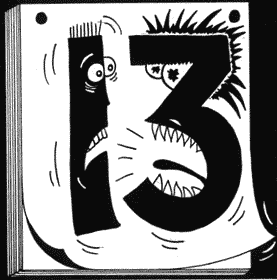Tracing the origins of Friday the 13th is a tricky process, since history has a habit of erasing much of what causes superstition. Often it is a number of things that happen over time, or something so big and unforgettable that it sticks with us for thousands of years.
Maybe the movie about Jason Voorhees’ hockey-masked day of  mayhem contributed some to Friday the 13th fear, but Chaucer mentioned Friday as unlucky over 700 years ago in the Canterbury Tales. There’s such fear surrounding this day that scientists even assigned it a 21-letter name, Paraskevidekafriphobia (fear of Friday the 13th), and Triskaidekaphobia (fear of the number 13).
mayhem contributed some to Friday the 13th fear, but Chaucer mentioned Friday as unlucky over 700 years ago in the Canterbury Tales. There’s such fear surrounding this day that scientists even assigned it a 21-letter name, Paraskevidekafriphobia (fear of Friday the 13th), and Triskaidekaphobia (fear of the number 13).
The Holy Bible actually has multiple references of bad things happening on a Friday. Of course, “Friday” as we know it didn’t exist in that time, but let’s humor the idea that Adam and Eve ate the  forbidden fruit on a Friday and the temple of Solomon was destroyed on a Friday, and of course the day of Jesus’ sacrifice was Good Friday.
forbidden fruit on a Friday and the temple of Solomon was destroyed on a Friday, and of course the day of Jesus’ sacrifice was Good Friday.
But what about the number 13? Many think that it goes back to the Last Supper. That’s right, Jesus and his apostles’ last supper together before the crucifixion is the widely accepted origin of the aversion to the date and the number. Twelve apostles and one savior equals thirteen, and guess who was the 13th man to sit at the table? Judas Iscariot, the one who betrayed Jesus to his death on the cross.
The following Friday after the Last Supper is Good Friday, the day Jesus was crucified. And as you may know Judas took his own life after the betrayal, so the  implications for being the 13th man are clearly negative. This grew into a superstitious tradition of having all guests sit or stand at once, because in a group of 13 no one wanted to be the 13th one sitting down or leaving the table.
implications for being the 13th man are clearly negative. This grew into a superstitious tradition of having all guests sit or stand at once, because in a group of 13 no one wanted to be the 13th one sitting down or leaving the table.
Good Friday is bittersweet for Christians, though, since it is that day that the savior died, and that death was the thing that atoned the sins of all humanity. So is that really something to be considered “bad luck” in the long run?
Some cultures, like Latin America, think of Tuesday as the unlucky one. You may hear the phrase “Martes, ni te cases, ni te embarques” (Tuesday, nor get married, nor embark) which basically means stay inside, don’t travel and don’t even think about celebrating a bond of marriage on a Tuesday. The  reason for Hispanic aversion to Tuesday instead of Friday is also pretty unknown, but possibly because the Greek god of war and destruction, Mars, is the root for “Martes.”
reason for Hispanic aversion to Tuesday instead of Friday is also pretty unknown, but possibly because the Greek god of war and destruction, Mars, is the root for “Martes.”
Numerology actually speaks well of the number 13, saying that it is a number for determination and continuation. Since the number 12 often signifies completion or the end of something, 13 is what comes after, the dust settling or finding the will to move forward after hardships.




















Interesting information!